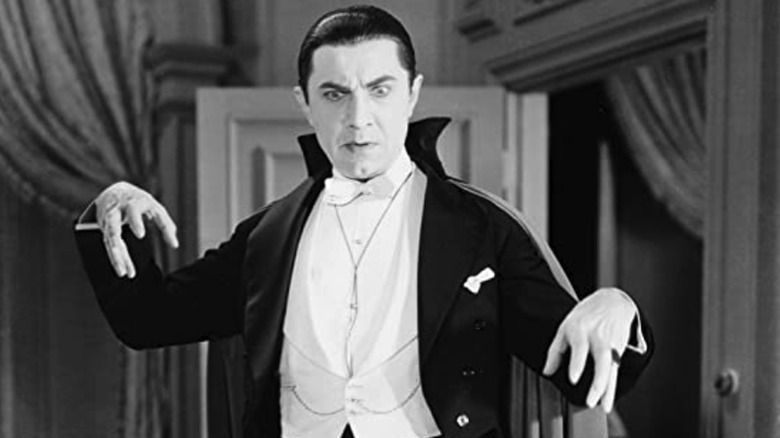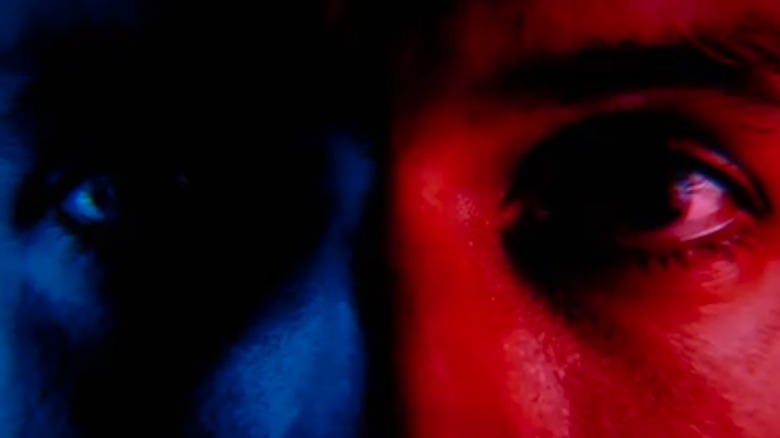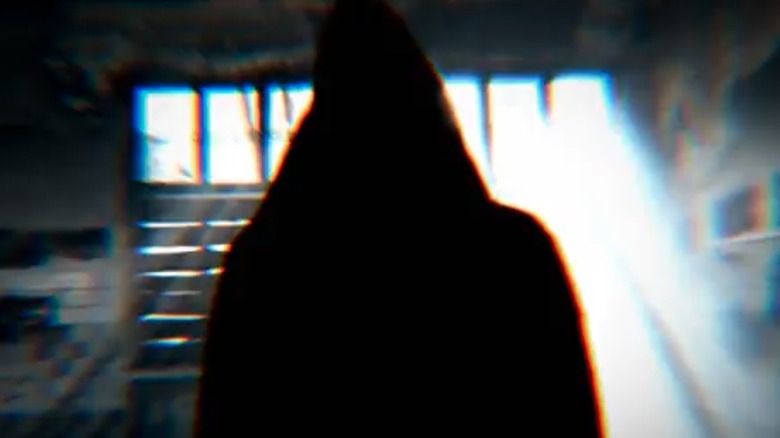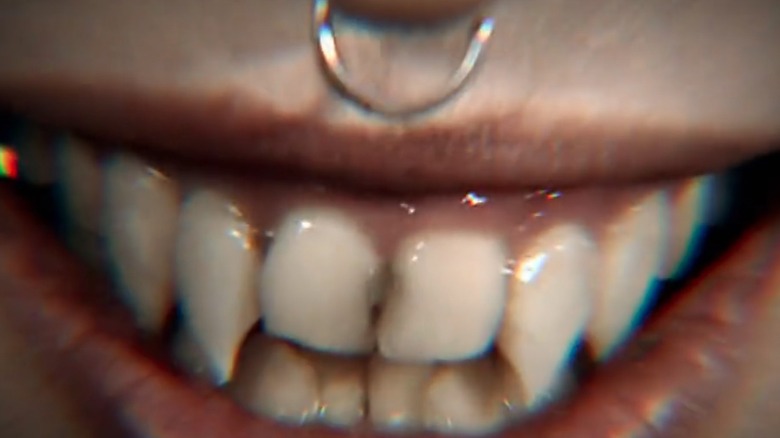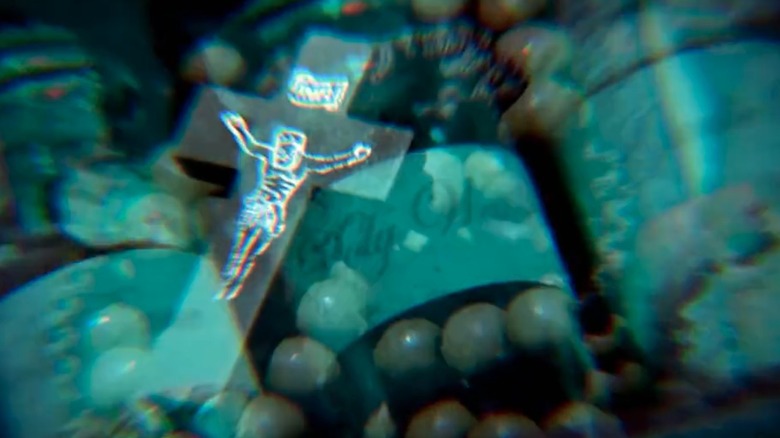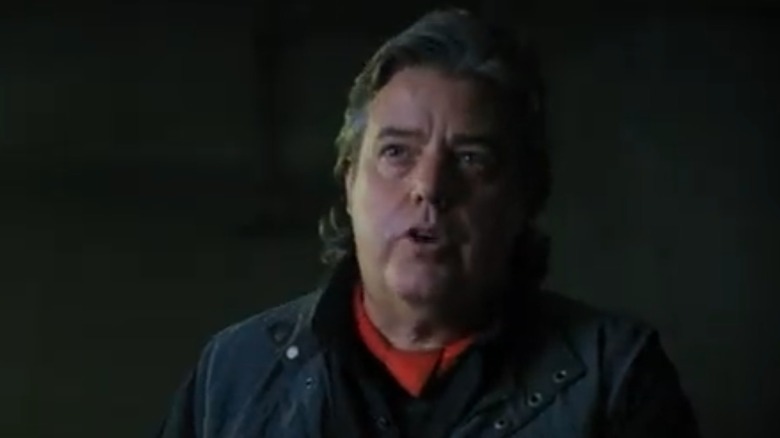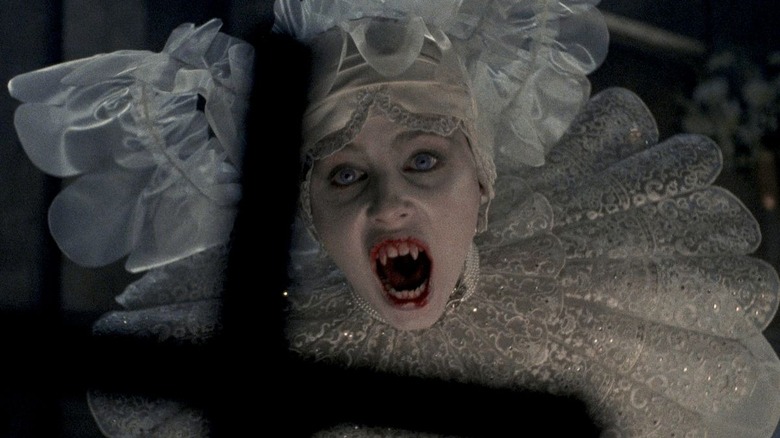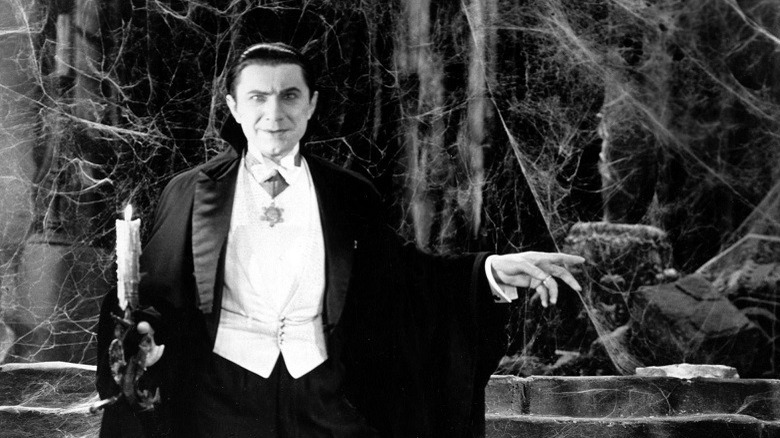Vampires In America: We Sink Our Teeth Into Vampire Lore With 'Real' Vampire Hunter Eric Streit [Interview]
On February 1, 2022, Travel Channel and Discovery+ released the special "Vampires in America." I wrote a story about it here on /Film, and I had a whole lot of fun with the trailer. Afterward, I was contacted by one of the vampire hunters in the show, Eric Streit. He had a great sense of humor about it all, and I got a chance to speak with him in depth about the series. We talked about his theory of how long vampires have been here, disagreements with his hunting partner Marcel Von Tingen, and whether or not vampires are real. Oh, and we also chatted about vampires shopping for toothpaste. Hey, it's the Year of the Vampire on /Film, so it's the perfect time for a deep dive.
A recent and alarming surge in homicides and missing persons cases in the southwest US has vampire hunters concerned that a large group of vampires may have emerged from hibernation. #VampiresInAmerica is on @discoveryplus and on Travel Channel tonight. https://t.co/WeEKmzurqo pic.twitter.com/OdUZaOEWME
— Trvl Channel (@travelchannel) February 1, 2022
I had a lot of fun with that article and you had a great sense of humor about it. So let's start with the show. You'd mentioned there haven't been a lot of promotions for the show. So tell me a little bit about it and what the production was like.
Well, "Vampires in America" is basically a two-hour special that explores the legend, the myth, and the lore of vampirism and vampires. And basically, we're just seeking to find answers to longstanding questions that I've always had. We're kind of exploring the space between myth and reality. We've got some compelling stories and a possibility, and we're investigating that vampires may live among us today. I know people think I'm crazy. I've been on this journey since I was kid and people think it's nuts and that it's outrageous, but I just want to encourage people to explore the unknown and just be open to the possibility that there's so much more to discover in the world today. And who's to say vampires are not real?
What do you think about why people are so compelled by the idea of vampires?
Well, first of all, vampires are said to be immortal. That in and of itself is an enticing and alluring idea: It is it possible to become immortal and live forever? Because I think so many people would like to live forever. Vampires and ghost stories, and any story that has to do with immortality is kind of the flip side of the coin when it comes to religion. In religion, and you go back to ancient times, every civilization has had their place where when you pass from this life, you go on and you live forever. And the flip side of that, vampirism, or any other paranormal ideas, suggest that you don't have to wait 'till the afterlife. You can live forever right now.
But from a mythological standpoint, to do that, you have to give up your humanity. And you can only walk at night. Before the dawn of electricity and lighting, nighttime was a very scary place and people gathered around a campfire for safety and for warmth and for community. But vampires, they were hidden during the day — they were buried, they were in caves, they were in shallow graves, they were hidden in hollow trees. So they never saw sunlight. And they were forced to walk at night and walk alone. So that was a trade-off: Life forever, but only at night.
What a question. What a quandary. You can live forever, but only at night. Sir Richard Burton, who wrote the first translation of "One Thousand and One Arabian Nights," before that, he discovered a book, "Vikram the Vampire," an ancient tale that was part of ancient Indian — the continent of India, not the Native Americans — this ancient tale of a vampire; "Vikram the Vampire." I'd encourage you to Google that and learn a little bit about Vikram, but that translation preceded "Bram Stoker's Dracula" by 25 years, I think. It was published in 1873, if my memory serves. So the idea of immortality and the trade-off that comes with that, I think, is something that draws people in. Sorry to be so long-winded, Jenna. I get so excited when I talk about this stuff.
Vampires and Religion
I watch vampire shows all the time. It's interesting that you bring up religion because I'd love to know your thoughts on why people choose to believe certain things, but push other things into the realm of myth.
Well, I think cultural conditioning. I don't think it's any more simple than that. It's cultural conditioning. Every different culture has its own religious beliefs. There's Hinduism, there's Christianity, there's Islam. Down here in Latin America, there's a lot of Santeria. And Santeria is a combination of Voodoo or Vodoun, which came from very early Africa and came across with the slave ships. It was in Haiti, the Dominican Republic, and South Carolina, and certainly New Orleans, and it made its way throughout Latin America. It's a combination of Catholicism, some very ancient, traditional African religious lore, and it's got its own take and it's kind of become its own thing. But it used to be a hodgepodge of different faiths and beliefs that were put together by people that weren't allowed to learn to read. So it was all storytelling, passed down from generation to generation. That's where Santeria comes from, which is very prominent in the Caribbean and in Latin America. It's a beautiful religion, but it also explores the dark side of the spiritual realm.
I'm curious because people love these shows so much. I mean, I actually went ghost hunting with the "Ghost Hunters" once.
Oh, wow. That's very cool.
It was. But people tend to wonder if these shows are real, if they're reenactments, if they're staged. So I'd love to hear your thoughts on that.
Well, I have a lot of thoughts on that. Stories covered are based on true life events, are they actors, are they real people? I would rather leave that for your own judgment. I want people to take this show how they want to take it. I hope that they're inspired to explore the possibility that vampires exist. I don't want to reveal too much, but I'm just very happy with how it turned out. We're getting a lot of viewership and a lot of people watching and a lot of people asking the right questions. And that is exciting.
Vampire Encounters
You know, it's funny. I don't believe in vampires, and yet I watch every show that has anything to do with them. So I get that. And I'd actually love to hear your personal history with vampires, because I know you said you saw one in 1988.
Sure. I did. I saw one in 1987. And look, it's very easy to lean in on the entertainment value of vampire shows. About every two years, it comes back around. We have such a resurgence right now, the vampire genre. "What We Do in the Shadows." The remake of "True Blood." I mean, the long Hollywood history of vampires. Drew Barrymore has a huge connection to the horror genre, particularly the vampire genre, through her grandfather, John Barrymore, who did one of the early silent era horror films.
But for me, my personal journey with vampires, I grew up in Western Kentucky, a town called Paducah. I come from a family of storytellers, and I grew up around campfires and people telling stories about the legend and lore, and vampires were a big part of that. I grew up in a river town. Paducah, Kentucky is where the Ohio, the Tennessee, the Clarks River, and just a few miles down, it's where the Ohio River meets the Mississippi River. It's a river town, and I have uncles who were riverboat captains. My father was a sheet metal worker and he always worked at a building along the river. And the stories you would hear about post-Civil War era of traveling salesmen and runaway slaves and prostitutes that would just disappear. The newspapers are full of those stories. And my whole life growing up, I was told by the older generation, born before the turn of the 19th into the 20th century, that would say what was out there killing people along the river, they weren't human. People believed they were vampires. That was the old country tale that I grew up hearing from my babysitter, from my nanny, from my mother, my grandmother. They all told stories ...
Years later, when I just became so fascinated with Dracula, on our local public broadcast station, there was a thing called the "Friday Night Fright." We had a host and he loved to do the old Bela Lugosi and Boris Karloff and Lon Chaney films. And the one that most fascinated me was "Dracula." I went to the library, I think I was eight years old, and I read "Bram Stoker's Dracula." And I was mesmerized. I was way too young to read the book, so I just read it over and over and over until I was old enough and really grasped what it was about. My mother would buy me the more condensed, dumbed down children's version. I really absorbed the book more than just read it, Jenna.
The only book that Bram Stoker is known for is "Bram Stoker's Dracula." I started to get my hands on some of his more obscure work, which, before the internet, was not easy to do and I had a lot of help. And it doesn't compare. It's not the same. Before "Bram Stoker's Dracula" was written, and after he wrote "Dracula," none of the style is the same. It's a completely different voice. It's a completely different style. When you read Agatha Christie, when you read Sir Arthur Conan Doyle and the other authors of that era, there's a consistency. But when you read Bram Stoker, there's one work that stands out and nothing else compares. It's a different voice. And I thought that was really strange. And it was always with me.
Even Vampires Need to Brush Their Teeth
Growing up, [I was] encouraged by my family to explore the unknown. Could werewolves be real? Is Bigfoot real? We had a thing called the Big Ol' Cat — my father and grandmother told stories about this giant, big cat that lived in the woods, and there had been tales of it since at least the 1910s. I grew up in the '70s and you would hear movement through the woods and you were led to believe and encouraged to believe that the Big Ol' Cat was real and vampires were real, and don't dismiss things out of hand just because you can't see them. Look at it. Investigate it. Explore it. Find the truth, because the truth is not always what you see with your eyes.
That is the parallel to religion. In the Christian faith, people believe what they can't see, and the Catholic Church has done an amazing job over two millennia crafting this magnificent pageantry and symbolism and rituals. It's breathtaking and beautiful. There is a comparison. I'm not suggesting that vampires are religious or anti-religious, but there is a human need to explore and embrace the unknown and believe in something.
That makes sense. I know you had said that you believe that vampires have sort of dictated vampire fiction. But one of the things that your partner said was, he mentioned they could be priests or they could be in the grocery store or things like that, which I joked [about in the article].
Yeah. What you said in your article, I laughed, because this was a discussion that Marcel and I had. Vampires do walk among us. And there is a legend and a lore to vampires, and then there's the real — what we believe. A vampire walking around a grocery store, he's also grocery shopping, but he's not grocery shopping for orange juice on aisle seven or pork chops in the meat section. He or she is shopping for the most delicious shopper who is alone at 2:00 AM, and basically stalking their prey. A grocery store is a great place to do it. In a city like Los Angeles, the grocery stores are open 24 hours. The vampires can go in a grocery store and do a little bit of shopping, shall we say.
I like the idea of a vampire shopping for toothpaste.
Yeah.
I mean, I suppose they need that.
[Laughs] Yeah. Well of course. It's funny. You never think of the mundane things. They're hominids. Vampires are hominids. They appear immortal because they can hibernate for 200 years, we estimate. So are you living forever or are you just hibernating like for a year or two, or 10, or 200? And then you come back rejuvenated and fresh, start over again.
And I feel like you'd need the toothpaste after 200 years.
Sure. Well, look. A vampire, they have a mouth, they have teeth. They drink blood. They probably, I would say, they need a toothbrush every day.
Definitely.
Because if they're not derelict vampires, they're sanitary and brushing their teeth and doing the right stuff.
The Rules of Vampirism
The priest thing [where Von Tingen says vampires "could be your priest"] was actually something that stuck out. And I wondered, because of what you said about vampires dictating fiction and whether or not they can be priests. There are all these rules for vampires in terms of crosses, and garlic, and light, and holy water, and things like that. What are the rules that you guys believe vampires have to follow?
It's funny. Marcel and I differ in opinion on a lot of that. Marcel is a devout Catholic and he has a strong faith and a strong belief that goes back generations in his family. He wears a crucifix and I carry one in my vampire hunting kit as well. Does that mean that we believe that vampires are going to be burned to death by a cross? No. But all vampires are not created equal. There are some vampires that actually will buy into the legend and the lore as they read it because maybe they don't have a vampire mentor. Maybe their knowledge of their people is cut off from the rest of the vampire community and their references are the same as our pop cultural references.
So they may well believe that a crucifix will hurt them. There's power in ritual. There's power in symbols. Do I believe a vampire will be burned by a cross? No. But I do believe that they may be thrown off their game a little bit, that it may make them uncomfortable. They have a powerful sense of smell. The whole legend that garlic will bother a vampire is because of their powerful sense of smell. Just like a dog doesn't like the smell of garlic. A lot of people who want to protect themselves from stray dogs or feral cats or any other predatory animals, they will squeeze garlic juice into a spray bottle with water and salt, and they will spray that at the animal. Remember, [vampires are hominids], but they have heightened senses. They have strength and they have a sense of smell and eyesight that's just beyond what we can imagine. So the smell of garlic and other powerful herbs is probably very uncomfortable for them.
You said a little bit about the history of vampires existing in 68,000 BCE. I was just curious about how that number came up and where you took that from.
68,000 years ago, the earth experienced a huge shift. It was called the Toba eruption. And the Toba eruption, it basically blanketed the Earth with a volcanic ash and we went into a miniature ice age. I think it's estimated by scientists that the Earth was down to about 500 breeding hominid couples, or a thousand people. Basically, humanity had to figure out how to survive. We believe that alongside human beings, there was an offshoot of hominid that became, instead of eating flesh and fruit and vegetables, they, like certain species of bats, certain mosquitoes — there are a lot of different creatures that survive on blood, and they're nocturnal. Bats are an example. That's why bats are so closely related to vampires, because like a vampire, a bat is nocturnal, and they come out about five minutes after sunset, they go back into their cave or their tree or wherever they're hiding about five minutes before sunset, and vampires are the same way. And over 68,000 years, to survive, these formerly hominids, human beings, basically evolved and learned to adapt. To survive, they adapted to hibernation and living on blood.
Wait, HOW Long Have Vampires Been in the USA?
I know you had also mentioned in that same segment that you guys think that they came here en masse during the Civil War, and that we have about 20,000 vampires nationwide. So I'm curious about that because I know there was the New England vampire panic that happened before the Civil War.
There was. Look, I've got files of all the different vampires sightings that date back into, in what's now the United States, back to the, I think, 1600s. But those were isolated. Now, remember: Before mass transportation, the only way one got to the United States was on ships. Vampires were being hunted in Europe in the 19th century at a tremendous rate. And it was a dangerous journey, but suddenly, when Britain and France mastered the seas, they were able to ship themselves over in cargo holds and come to the New World. And certainly there were some vampires that came before, just like settlers came to Jamestown and different parts of the United States. But vampires made their way over in very small numbers. But when they were being hunted aggressively in the 19th century in Europe, that's when they started to make their way to the United States and Latin America, primarily Mexico.
I'm really interested in the idea of shooting this special, and what would happen if — say you do find one. What would you do? Because if there are that many here, no one's obviously caught any that we know of, but what would you actually do?
Well, we talk about that a lot. My goal in meeting a vampire is to learn. I would want to sit and — they're here. Vampires are here. It depends on the vampire. If he's an aggressive vampire, it's just like when there is a person on the run and they escape and people are looking for them. When you find that person, how do you approach them? It depends on the situation. It depends on the individual. My belief is that, if approached properly, you can sit and have a discussion with a vampire under certain circumstances. That would be my goal. My life's ambition is to sit down and have an on-camera interview with a genuine vampire.
I want to interview the same vampire that crafted the idea for "Bram Stoker's Dracula," that sat down with Anne Rice and did "Interview with the Vampire," but I don't want it to be fiction. I want to see them come out into the light and just coexist with humanity. It's time.
Could You Interview a Vampire?
Say this could happen. If, say, this were possible. Do you think people would even believe it?
I don't know. Based on a lot of the comments we're seeing on the threads, I think people don't believe it. But every idea is ridiculed at first until it's proven. Galileo, Sir Isaac Newton, Thomas Edison. Anyone that's achieved a great leap forward for humanity has first received and been on the receiving end of ridicule. I've been made fun of and ridiculed my whole life for my research and belief in wanting to find proof that vampires exist. I was reluctant to actually do a show. But to have the opportunity to put that story out there into the public sphere, most people aren't going to believe it, probably, but a few might. And we'll see.
Television is a great way to reach an audience and reach people that might believe and see if they've got a story to tell. I like to believe that vampires want to be accepted and vampires want to be out of the shadows and live their life. Most humans function during the day. Vampires function at night. The same way birds fly around during the day, and then the birds roost five minutes before sunset, the vampires come out five minutes after sunset. There's no reason that I think we couldn't live together in a more harmonious way and bring these vampires out of the shadows. A lot of people think that's bats*** crazy.
But it's fun.
You know what? At the end, it is fun. Take my belief completely out of it. And I'm fine with everyone saying, "Eric Streit is a lunatic and he is a madman." I'm fine with that. But at the very least, I think there's an entertainment value to the show, and it's fun. You can believe it or you can watch it for entertainment and the fun of it. It can work on two levels. If you believe it, come along on that journey and help us explore. If you just think that we're two crazy guys that are wasting our time and are absolute mad men, I'm fine with that, too. It's liberating to have my story out there.
That makes sense. I know that you've done some production in terms of reality TV, like "The Great Food Truck Race."
Yeah!
So if you do another special, what would you, even from the producer's side, from the director's side, what would you want to see?
I was in the Navy for five years and I traveled the world. I was so fortunate to be on three different ships, and I traveled through the Mediterranean, the Middle East, and Africa. That gave me the opportunity, when I got shore leave, all the other guys would be hitting the bars and the clubs and wanting to meet girls, and I was out there looking for clues, finding out what can I discover about the unknown, about vampires, about the legends, the myth, the lore, and the reality of vampires.
When you get out of the military, your travel's not free anymore. You've got to pay for that. I've been very, very fortunate to find a career, and television has afforded me a career to travel all over the world doing productions. They pay for your room and board, and When you're done with production, you go and track your own interest at night. I've been really lucky to travel all over the world in the military and in the television industry, and it's given me the opportunity to explore vampires on someone else's nickel for the last 35 years.
The Best Portrayal of a Vampire Goes To ...
/Film's doing something this year for the anniversary of "Nosferatu" called Year of the Vampire. So I would love to know if you've got some favorite vampire films or shows.
My favorite, favorite, favorite, favorite, favorite vampire film of all time will always be the one that touched me the most, is "Dracula," the original Universal Studios, 1931 [movie] starring Bela Lugosi as Dracula and based on "Bram Stoker's Dracula." I hear people argue that, "Oh, Nosferatu is a better film. It's a silent film and it's a lost classic." [Or] Peter Cushing was so much better than Bela Lugosi." I disagree. I think Bela Lugosi, he originated the role of Dracula, which is the vampire fiction that was masterminded alongside Bram Stoker by some vampire to craft the story so people would never believe in vampires again. And it worked. And to this day, most people don't believe in vampires because A) Bram Stoker took dictation and published "Dracula," which became a huge hit, and then just as people were forgetting and maybe starting to believe again, suddenly Bela Lugosi comes along. He had been on Broadway and he had played Dracula in his home country. Now he's at Universal making this movie and it is a super low budget B movie, but it catches on around the world. Then it starts to wane again and people have forgotten it. Then television comes along and you're seeing Bela Lugosi on Saturday morning, Friday nights, and Saturday nights. The ultimate portrayal of the vampires is Bela Lugosi.
And I think the feature film, "Interview with the Vampire," with Tom Cruise, Brad Pitt, and Antonio Banderas. When you look at that movie after reading the book, the book and the movie feel the same. The feeling I got reading "Interview with the Vampire" was the same feeling I got watching the movie. That's hard to do.
"Vampires in America" is currently available on Travel Channel and Discovery+.
